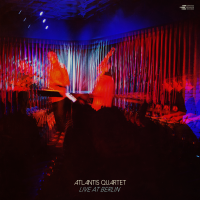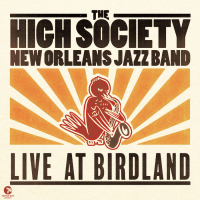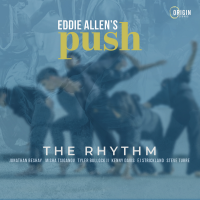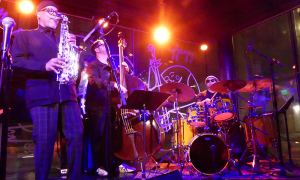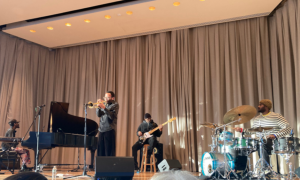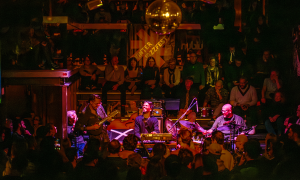Home » Jazz Articles » Live Review » Roberto Olzer Trio's Homage to the music of Enrico Pieranunzi
Roberto Olzer Trio's Homage to the music of Enrico Pieranunzi
Studio Annette
Tel Aviv
October 31, 2025
"Good things come to those who wait."—the old adage certainly applied to Roberto Olzer Trio's homage to the music of Italian legendary pianist Enrico Pieranunzi.
Originally planned for May 2025, the event was postponed due to the war in Israel but finally took place on October 31st at Studio Annette in Tel Aviv. And the wait was so worth it! Roberto Olzer is quite familiar with the Israeli audience, having performed here a few times already, and the obvious complicity he has with his trio members just enabled him to celebrate Pieranunzi's poetic sensibility with fresh nuance and reverence.
Joined in by Assaf Hakimi on double bass and Roy Oliel on drums, the trio offered a luminous and deeply felt homage to the music of Enrico Pieranunzi—one of Europe's most lyrical jazz pianists. Veteran clarinetist and saxophonist Robert Anchipolovsky accompanied them on three pieces, infusing them with his big, bold energy.
Over the course of fifteen carefully curated pieces drawn from Pieranunzi's vast and luminous songbook, the Olzer Trio offered an aural journey shaped by lyricism, introspection, and subtle melodies.
The evening opened with "No Man's Land," setting the tone with its introspective lyricism. Olzer's touch—crystalline yet warm—revealed his affinity with Pieranunzi's phrasing. The trio's interplay was immediately evident: Roy Oliel's brushes murmured, while Assaf Hakimi's double bass displayed vulnerability and poise. The whole piece felt like an Impressionist painting—a poetic space filled with subtle shifts of colour.
Pieranunzi has always been fond of standards, so it seemed logical that "Yesterdays" would be on the playlist for the night. The trio's interpretation swayed gently between nostalgia and awakening. The melody opened in near silence, but when Hakimi's double bass joined in, it gained quiet depth, like a grounding heartbeat beneath Olzer's introspective phrasing. Similarly, Oliel's drums barely disturbed the stillness; his cymbals breathed rather than struck, shaping time with whispering restraint. As the piece evolved, it returned to offering a trace of melancholy warmth, thus making "Yesterdays" a quiet act of remembering.
The cinematic "Fellini's Waltz" unfolded as a reverie—delicate and dreamlike—while "Valse pour un pavane" and "Les Amants" both showed the pianist's deft control of rhythmic elasticity, letting the compositions find a rare balance between grace and introspection. In the former, Olzer let the music breathe, shaping it with a more romantic, expansive touch, creating an emotional space that felt intimate and yet radiant.
Yet, he never plays melodies in a sentimental way but rather deeply felt. With Olzer, the music almost always feels poised between sadness and serenity, between motion and stillness.
"Les Amants" ("The Lovers"), one of Enrico Pieranunzi's most romantic ballads, feels like a conversation between two souls suspended in time. The piece opens slowly but then rises gently, hesitates, and falls again, creating tension through subtle modulations and evoking quiet intimacy—like two lovers speaking softly, aching for connection. Anchipolovsky's clarinet only emphasized the movement of undulation, echoing that constantly shifting emotion, just like the feeling of love itself.
Midway, Olzer gifted the audience with "Islas," played solo, as he ventured into a soundscape of solitude and serenity. It is a poetic composition where the music gradually breathes expansively, the melody unfolding in fragments, and by the time it reaches the closing passage, "Islas" becomes a contemplative landscape of its own, leaving the listener suspended between sound and silence.
"Je ne sais quoi" is one of those compositions that perfectly embodies the phrase it's named after—something elusive, indefinable, and quietly enchanting. It is a cheeky piece that has that certain blend of lyricism, swing, and refined melancholy that feels unmistakably Pieranunzi.
Followed was "First Song," one of Charlie Haden's tender and lyrical compositions, and one of particular emotional significance to Hakimi. It offered a moment of intimate stillness, Hakimi's arco bass line almost vocal in its expressiveness. It is a slow, yearning melody that unfolded with the unhurried grace of a love theme: its phrases breathed deeply, and its harmony carried a sense of great melancholy. The entire timeless composition is tinged with sadness.
In the final stretch, "The Chant of Time" deepened the concert's emotional arc. It is an introspective composition where music becomes a reflection on silence, space, and the passing of time itself. Emotionally, the piece feels spiritual yet human, blending serenity with quiet yearning. It's not mournful, but reflective—a meditation on impermanence, beauty, and continuity.
"Heimweh" (Homesickness), which Olzer dedicated to the recently released Israeli hostage Alon Ohel, a pianist himself, and "Hindsight" closed the concert with moving simplicity, where each melody was suffused with gratitude.
Roberto Olzer Trio's tribute to Enrico Pieranunzi was a concert that unfolded as an intimate conversation between past and present, between reverence and rediscovery. It was, in the truest sense, an homage: a group of talented musicians coming together to illustrate another artist's voice, all united by a quiet devotion to melody, memory, and time.
This concert showed no imitation—only communion. The Roberto Olzer Trio did not approach Pieranunzi's music as one plays a repertoire; they lived it. Their phrasing breathed; their silences spoke. And in doing so, they reminded the audience—just like Pieranunzi does himself—that jazz, at its most honest, is not performance but poetry.
Tags
Live Review
Roberto Olzer
Nathalie Tamara Freson
Israel
Tel Aviv
Enrico Pieranunzi
Assaf Hakimi
Roy Oliel
PREVIOUS / NEXT
Support All About Jazz
 All About Jazz has been a pillar of jazz since 1995, championing it as an art form and, more importantly, supporting the musicians who make it. Our enduring commitment has made "AAJ" one of the most culturally important websites of its kind, read by hundreds of thousands of fans, musicians and industry figures every month.
All About Jazz has been a pillar of jazz since 1995, championing it as an art form and, more importantly, supporting the musicians who make it. Our enduring commitment has made "AAJ" one of the most culturally important websites of its kind, read by hundreds of thousands of fans, musicians and industry figures every month.



